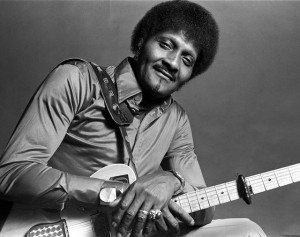Alan Paul's Blog, page 44
November 9, 2012
Ladies and Gentlemen, Mr. Albert Collins!
Please check out my Amazon Ebook One Way Out: An Oral History of the Allman Brothers Band (Kindle Single).
My good friend Kirk West has been going through his negatives and digitizing decades of great photographs. He has wonderful images of many subjects, including Croatia and the backroads of the American South. But the heart and soul of his work lies in images of musicians, from Bruce Springsteen to Lefty Dizz. His Chicago blues images are particularly wonderful, capturing an era of music and lifestyle that not only means a lot to me, but to American culture.
You can see more at his website: Kirk West Photography.
Here I present some of my favorite images of one of my favorite guitarists, the late, great Albert Collins, the Master of the Telecaster, the Iceman.
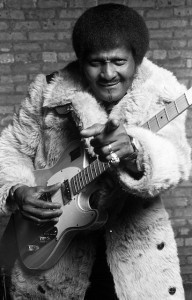 Albert Collins Foto by Kirk West
Albert Collins Foto by Kirk West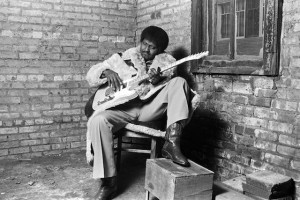
Albert Collins Foto by Kirk West
October 28, 2012
An Interview with Warren Haynes: Gov’t Mule’s Georgia Bootleg Box
 The Mule. Macon, 1996. Awesome Foto by Kirk West. http://www.kirkwestphotography.com/
The Mule. Macon, 1996. Awesome Foto by Kirk West. http://www.kirkwestphotography.com/
Please check out my Amazon Ebook One Way Out: An Oral History of the Allman Brothers Band (Kindle Single).
Gov’t Mule recently released the first installment in their ‘Bootleg Series.’ The Georgia Bootleg Box is a 6-disc set capturing a 3-night run from Georgia in 1996. The band was recorded live at The Georgia Theater in Athens on 4/11, The Roxy in Atlanta on 4/12 and Elizabeth Reed Music Hall in Macon on 4/13. The box features the band’s original trio of Warren Haynes, Matt Abts and the late Allen Woody, with guest appearances by a young Derek Trucks and Tinsley Ellis.
You can hear the 4/11 version of ”Blind Man In The Dark” here.
I caught up with Haynes to discuss the new release, which is on Evil Teen Records. This interview also ran on and was conducted for guitarworld.com.
Why did you choose these particular shows to release?
I just really liked the way they were captured and thought they offered a great snapshot of where the band was at that time. I thought Woody was playing his ass off and the whole band was playing great. It was us after about a year and a half of being together, so we were cohesive but still very hungry and trying to prove a point. We were still growing every week, adding songs to the repertoire, writing new songs, rehearsing them at soundcheck and then playing them that night.
A lot of the rehearsals took place in Georgia, in the old Capricorn studios and at the Big House, which was then the home of Kirk and Kirsten West. So, though we didn’t live in the state, it played a big role in our birth and development.
You and Woody were still in the Allman Brothers, which you would you leave in another year to focus on the Mule. Were you starting to think of this as something more than a side project?
Yes. We didn’t look at it as something that was going to go on year after year and continue to make records, but we had made the decision to at least make an effort to really take it somewhere. It wasn’t just about playing fun gigs. Now it’s been 17 years!
In the beginning the audiences were small, the ticket prices were low and we weren’t putting ourselves under any pressure. There was a looseness that comes from that. On the other hand, we had a lot to prove because in the beginning a lot of the crowd were curious Allman Brothers fans who wanted to see what me and Woody were up to and they were often surprised that we sounded so different. My explanation was always, “Why would we start a side project that sounds just like the band we’re in?” That never made sense to me.
Obviously, you want the people who are there to enjoy the experience as much as possible, but they usually stood with us and once they realized how much fun we were having, they were along for the ride.
Did the security of the Brothers gig allow you guys to take more chances in the Mule?
Yes, I think so. We were just creating the parameters of what the Mule was, which didn’t exist yet. There wasn’t the pressure of Gov’t Mule being our only source of income or only source of musical creativity, but it was definitely what we were digging the most. We were a band of brothers. We were best friends and we were getting closer and closer and tighter and tighter. It was a really magical period for the band and for the music. We were playing together almost every night, we were getting to know each other personally and professionally quite well, and it was just a lot of fun.
Does digging into your past this deeply impact your thoughts on the current band at all?
Any time I listen to any of the old stuff, it’s always inspiring and inspires me to want to revisit some of the directions we were traveling. It’s more of a mindset thing. In the beginning, one of the things I loved about the band is the tempos were really slow. We all got into this mode where we loved that the band could play way back behind the groove and keep it so nice and heavy. There’s an art to that and a lot of bands get on the road and start speeding up the tempos, and when you listen to the recordings, they’re not as good for that reason.
I remember [Deep Purple bassist] Roger Glover talking about the word “heavy” on the Rising Low DVD. He thought that everyone misuses it and it’s not about volume, it’s not even the power of what you’re playing; he said it was the way the band fits together and the tempos that make it heavy. We were heavy.
Looking back and seeing how many songs we repeated reminded me that not only was our repertoire relatively small, but we hadn’t completely grasped the concept of doing a different show every night. We were shaking it up, but not to anything like the extent we would down the road.
As you are learning the repertoire, don’t you need to play songs over and over anyhow?
At the beginning, the more you play the songs the tighter they get. The only disadvantage to playing a different show every night is if a song really needs some work, you may not play it often enough, so the tightening doesn’t happen as quickly. But that downside pales in comparison to the upside – keeping yourself and the audience fresh and on your toes. And once you’ve worked up a song and are playing it really well, it always benefits from having some space to breathe in between performances.
Derek Trucks opened two of these shows with you and played with you. It’s so interesting to hear you working together then, now that you have such a deep, established musical relationship.
Listening to this stuff from ’96, it’s so obvious that he was really cool then. These particular collaborations sound great to me and remind how much fun it’s always been to play with Derek. He was fearless from the beginning. We would say, “We’re gonna do x y or z in this key” and he would nod and say, “Ok” and away we went.
You and Woody played together in the Allman Brothers for about seven years before forming Gov’t Mule. Did you develop a close relationship right away?
Yes we did, and by the time we formed the Mule that had really solidified. I had a solo band on the side for a while and we released Tales of Ordinary Madness in 1993. I enjoyed a lot about that experience and the shows we did, but I had come to the conclusion that I really didn’t want to be a solo artist. I wanted to be in a band. I’m comfortable calling the songs, I’m comfortable singing most of the songs, I’m comfortable being a leader but I didn’t want it to be all about me with hired guns. That just didn’t work for me in the same way. At the same time I was realizing that, Woody approached me and said, “Hey, why don’t we do something together?” So it all just clicked.
Please check out my Amazon Ebook One Way Out: An Oral History of the Allman Brothers Band (Kindle Single).
October 25, 2012
Fishing with Capt. Mickey, aka Dean Ween

Mickey Melchiondo aka Dean Ween of New Hope, PA has been my bud for about 20 years. It’s not like we talk all the time, but our friendship has endured for a long time. It was all based on the simple fact that I loved his music with Ween. In 94, when the great Chocolate & Cheese came out, Guitar World Editor Brad Tolinski and I became obsessed with it, started putting it on every evening around 7 pm as we were still toiling away, growing increasingly punch drunk. Then we started putting them into the magazine as much as we could.
My friend Eli Attie had already been nagging me about Ween for a couple of years but I just couldn’t follow his advice and get into them. Once I got it, I got it bad. I spoke to Mickey on the phone a few times, and the very first Ween show I went to, at Tramps in NYC, I ended up swigging Jack Daniels out of a bottle with P-Funk guitarist Blackbyrd McKnight and stage diving.
A few years later, when Ween’s seminal 12 Golden Country Greats came out I was living in Ann Arbor and I took the train to Chicago to see the country tour with Art Rummler. We were so inspired that we drove back to Detroit together to see them again.
There’s a lot of water under thebridge since then, and their music has meant a lot to me. It’s hard to explain why, but I never would have had the guts to form a blues band in China, call it Woodie Alan and take to stages in Beijing if not for the inspiration of Ween’s brown sound. All of which is to say I was more than happy to hit the water with Mickey last year for the following story, which ran in the Guitar Aficionado summer issue. Mickey’s a damn good captain. If you have a hankering for some Jersey shore deep sea fishing, drop him a line at his Facebook page.
Here’s the story:
Mickey Melchiondo stands in the bow of his boat, yanks back on the fishing rod, sinks a hook deep into a bluefish, watches the line run for a moment, spits a cigarette out of his mouth and lets out a cackle as he hands over the bending rod.
“Here you go dude! Have fun – you’ve got a hook into the best pound for pound fighting machine in the ocean.”
The handoff complete, Mickey slips around towards the rear, taking over the helm of the bobbing Archangel.
A half hour ago we were yanking Flukes off the bottom of the Atlantic with the Asbury Park skyline glistening on the shore. With several flopping around our cooler, Melchiondo gunned the engine towards the open sea to go after the big fish. Soon, one big, tough-fighting bluefish after another is being pulled in, each met with a giant smile plastered across Melchiondo’s face.
Capt. Mickey seems far removed from his alter ego, Dean Ween, guitarist and co-leader of Ween, a band he formed with Gene Ween (Aaron Freeman) when they were both 14. In the intervening years, the band evolved from a great idea into a great band. As anyone who has seen them live or listened seriously to their 14 albums knows, Deaner is an accomplished, inspired guitarist, attacking his red Strat with violent intent. He approaches fishing in a similar manner – as the giant bluefish spitting blood all over my shirt and the boat’s deck can attest.
“Fishing and guitar are the two things I’ve done consistently throughout my life,” Mickey says. “Being on the road with a rock band is such a grind, so I’ve always looked forward to going fishing, where I could spend six hours in a different mental space. It’s the most healthy thing I do in my life.”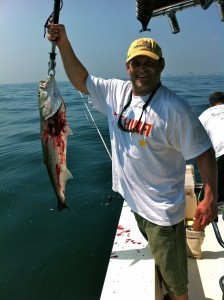
We’re off the boat now, back to some good unhealthy living, washing down pork roll-egg-and-cheese sandwiches and gravy-covered fries with Buds at an Irish bar next to the marina. With Ween touring less in recent years, Mickey explains, he had reason to ponder what else he might do with his time.
“What better gig in life could there be than being a guitarist in a band?” he asks. “Then I realized that I could actually turn fishing from a hobby into a profession and have a second gig that was just as cool.”
Several years ago, Mickey enrolled in a mariner’s school and began studying hard to get his captain’s license, which he would need to talk paying customers out.
“Every day, I took my charts to the library and set up my slide rule and plotted things out,” he says with a laugh. “This is fun but I take it seriously.”
Which doesn’t mean that there isn’t a certain Ween-ness about fishing on the Archangel. Mickey logs every trip on his company’s Facebook page, where one recent entry read, “Out of all of the trips I’ve run this one really stands out. Out of the four people on the boat today, 3 of us are covered in human blood. That’s really all I can say about that.”
He laughs when asked about that day of fishing. “Can’t go there,” he says. “But I’ll say that’s one of the things I love about fishing and how it’s similar to touring; every day is different and you never know what it’s going to be like.”
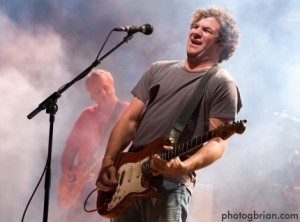 Mickey’s Guide Service began three years ago and his initial clients were mainly Ween fans who realized that for a few hundred dollars they could spend half a day with Deaner. The base has expanded, as Mickey’s reputation as a serious but fun-loving captain spreads. He’s still approaching it with the joy of an amateur.
Mickey’s Guide Service began three years ago and his initial clients were mainly Ween fans who realized that for a few hundred dollars they could spend half a day with Deaner. The base has expanded, as Mickey’s reputation as a serious but fun-loving captain spreads. He’s still approaching it with the joy of an amateur.
“Turning something you love from a hobby into a job can be dangerous, as I know from the band,” Mickey says. “But you can still get the joy out. When we’re on stage and the music is good, I don’t even realize there’s anyone standing in front of me, because I’m just lost in it. I get into that same level of intensity from fishing and that’s a beautiful thing.”
_
<A HREF=”http://ws.amazon.com/widgets/q?rt=ss_... Widgets</A>
October 24, 2012
Great new Led Zeppelin book
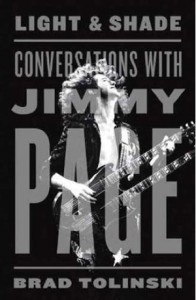 Guitar World Editor Brad Tolinski, my longtime friend and colleague has a great new book out, Light and Shade: Conversations with Jimmy Page. It is a must-have for any and all fans of Led Zeppelin. If you are one, go get it. If you know one, go get it for them for Chanukah, Chistmas, Kwanzaa or Election Day.
Guitar World Editor Brad Tolinski, my longtime friend and colleague has a great new book out, Light and Shade: Conversations with Jimmy Page. It is a must-have for any and all fans of Led Zeppelin. If you are one, go get it. If you know one, go get it for them for Chanukah, Chistmas, Kwanzaa or Election Day.
At the heart of the book are a series of extensive interviews with Page. No one has spoken with the guitarist more often than Brad and the conversations are deep, rich and largely musically focused.
It’s a great book, which is off to a great start and I’m very happy for Brad, who I consider one of the unsung geniuses of rock journalism, consistently putting out great articles that manage to go deep while remaining relevant and off the moment. Few people in music journalism have been able to manage this juggling act with half his skill for half the time.
I have learned a lot from Brad, who has also been incredibly supportive of me and my work for over 20 years. I’m proud of the relationship, which has outlived by far most editorial collaborations.
You can read an excerpt of Light and Shade here.
October 1, 2012
Django Reinhardt, 1910-1953
I just came across this tribute to the great guitarist Django Reinhardt I wrote long ago for Guitar world. It inspired me to listen to his timeless music and share it now.
Django Reinhardt
1910-1953
When 18-year-old Gypsy guitarist Django Reinhardt badly damaged two fingers on his left hand in a 1928 fire, he couldn’t have known that it was a historic moment in the history of guitar. But forced to deal with his fret-hand limitations – he could not use his fourth or fifth fingers — Reinhardt developed a brilliant playing style that propelled him to the fore of jazz innovators. Pre-amplification, the guitar generally played a rhythmic, support role, but Django’s shimmering, harmonically complex, perfectly articulated soloing brought the instrument into the spotlight.
Reinhardt’s true impact began when he formed the Quintet of the Hot Club of France with violinist Stephane Grappelli in Paris in 1934. With a unique backing of bass and two rhythm guitars, Django spun glorious leads, often in tandem with Grappelli, whom the guitarist also backed with incredibly propulsive rhythm playing. Like all true jazz greats, Django’s music was a remarkable blend of perfect technicality, soulful feel and good humor. Seventy years later, his playing still sounds fresh and original, filled with bent notes and a fantastic vibrato, standard techniques today which were virtually unheard of in his day.
The Quintet split up in 1939, when Grappelli stayed in London to ride out World War Two, while Reinhardt continued returned to his Gypsy caravan. In 1946, he toured America as a featured soloist in the Duke Ellington Band, playing an amplified guitar for the first time. After some unsuccessful attempts to play the newly emerging bebop, Reinhardt returned to swing, playing as powerfully as ever, if less frequently. He died at age 43 following a stroke and is buried at Cimetiere de Samois-sur-Seine, in Fontainebleau, France.
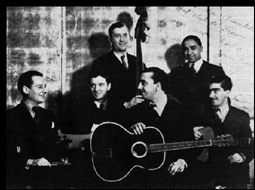 Hot Club of France
Hot Club of FranceSeptember 11, 2012
9-11 11 Years Later: Still Raw
 LIberty State Park 9-11 Memorial
LIberty State Park 9-11 Memorial

Eleven years later, 9-11 is still very, very raw to me.
Last year on the tenth anniversary, my whole family visited the Statue of Liberty and we went up in the crown. The security was tight. There were helicopters flying overhead. And when we got back on the ferry to leave, I looked back at the Statue of Liberty an felt as patriotic as I ever did and I thought, “She’s still here and you’re not.”
We took a family picture and we smiled because it felt good to be alive and to be together, and to feel like our way of life had not been destroyed. But we smiled with heavy hearts, because, of course, we thought about everyone who wasn’t there, everyone we all should remember on this day every year.
We came back from the Statue and walked through the very beautiful memorial in Jersey City, in Liberty State park. I walked through it silently, looking at the names etched on the side: husbands, wives, daughters, sons, lovers, friends who never came home. And I wept to myself.
It’s still so real.
I this was a national tragedy, but I just don’t think people outside of the NYC area felt it or understood it in quite the same way as those of us who were here in the metro area. We saw the cars sitting unclaimed in the train stations. The missing posters lovingly hand written and pasted all over the city, the candles burning in front of every fire station.
At noon on 9-11, I was at the South Mountain YMCA picking up Jacob, who was 3, and helping the director go through the files looking for kids who had two parents working in Manhattan, flagging two kids whose parents both worked in the Towers. It took hours until everything sorted itself out. One little baby girl lost her mother. A father around the corner never came home.
The next day I went up to the South Mountain reservation, walked over to the edge of the wall on the bluff overlooking downtown New York and where the towers used to be was a big grey cloud swirling around and filling the air – here, 25 miles away – with an acrid smell.
I want to make sure my kids understand, really understand, how real this was. How real it still is to me. So I will take them up there in a few minutes to lay some flowers at the memorial. It sprouted immediately, spontaneously and is now official, honoring our friends and neighbors who got up and went to work and never came home.
“Never forget” means a lot of things to a lot of people. I’m thinking of them.
August 10, 2012
Warren Haynes likes One Way Out
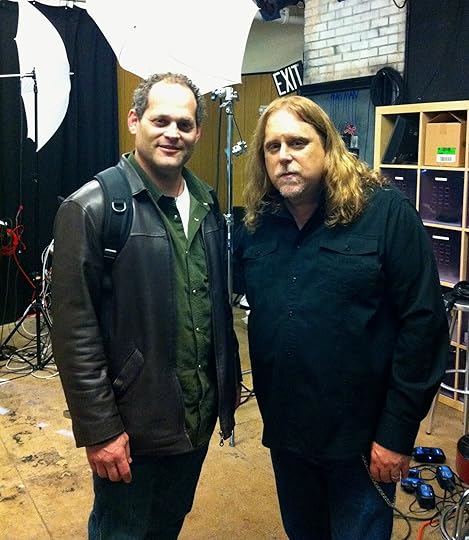 As I get ready to head to Scranton for the first annual PeachFest, here’s another reason to go spend a lousy 3 bucks on One Way Out: An Oral History of the Allman Brothers Band:
As I get ready to head to Scranton for the first annual PeachFest, here’s another reason to go spend a lousy 3 bucks on One Way Out: An Oral History of the Allman Brothers Band:
“No journalist knows the ins and outs of the Allman Brothers Band better than Alan Paul.”
-Warren Haynes, Allman Brothers, Gov’t Mule, Warren Haynes Band
In all seriousness, this means a lot. Warren has been a friend and one of my favorite guitarists for over 20 years and I consider him to be the man most responsible for the revival of the ABB – twice now, actually.
I hope to have some more exciting news about One Way Out soon. Stay tuned.
July 27, 2012
Four years later, looking back at the Beijing Olympics…
Wow, it’s been four years…
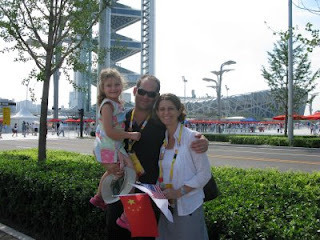
We took Anna to one event - gymnastics
I was in the middle of the Beijing Olympics in a most profound way, writing the Destination Beijing blog for NBC.com. Sadly, the material is all long gone from the site, which is, of course, now all London 2012, and I only saved a small amount of my work, though I am going to start digging through my own archives – I must have more of it than I realize.
Looking back through my blog takes me back to a hyperactive time. I certainly was busy, crisscrossing Beijing to cover the games, attend events, file back at the NBC office in the International Broadcast Center, run out to play high-priced black tie gigs like this, running over to appear on CCTV…
It was a really remarkable run, and a fitting culmination to our time in Beijing. As I wrote in Big in China, the Olympics dominated so much of our time there. They were such a huge, looming abstract presence that it felt almost surreal when they actually were under way. This Expat Life column captures that feeling quite well.
One of the most remarkable moments came after I spent a long, exciting but exhausting night running all over the city covering the opening ceremony, starting at the gate of the Bird’s Nest, then working my way out, reporting in a live blog how the remarkable event was being viewed in Beijing itself. I dragged myself into the Broadcast Center at 8 am, because I was catching a bus to a shooting event, which would award the Games’ first gold medal. I walked in to see the live NBC feed – the televised event was just beginning in the US. I watched for a while, almost believing it was live, despite my intense immersion the previous night. Then I turned away and almost bumped into Bob Costas, who was walking out of the studio after an all night work day. That all still spions my head a bit.
I still feel a bit guilty that we sent jacob and Eli away during the Games – they came back here with my brother and spent two weeks with various relatives before my in-laws brought them back – though it was a reasonable, and probably correct, decision. Becky and I were both working ’round the clock at the games, with intense, erratic schedules. Anna stayed and played with friends, and we did manage to take her to one event together – women’s gymnastics. Here’s my report about that.
It was also amazing to be covering the Games along with Becky… we have always had parallel tack careers, doing very similar work (journalism) that never really intersected. To finally find ourselves covering something together was just fun; the fact that it was women’s weightlifting was just bizarre.
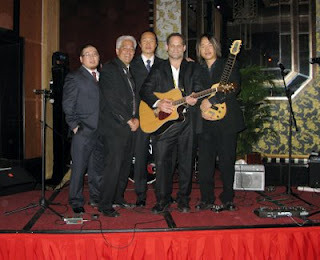
Black tie Woodie Alan - British Olympic Committee Ball.. How did we pull this off?
After all this, I do, of course, feel a bit sentimental as the 2012 Games get under way, but also a bit extra excited. I have some skin in this game now, I suppose. Happy Olympics.
July 5, 2012
One Way Out and other updates
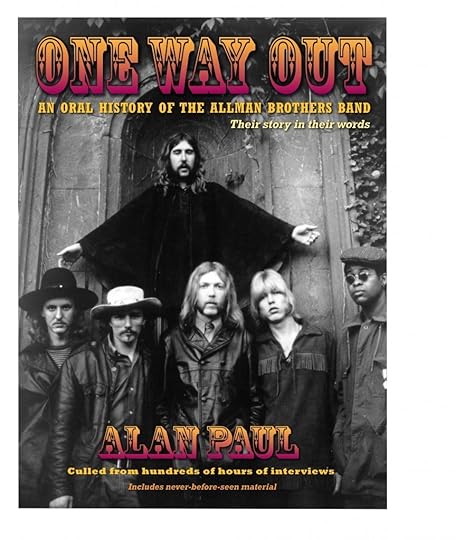 I am pleased to say that One Way Out: An Oral History of the Allman Brothers Band has been picked up and re-released by Amazon Singles. That doesn’t mean much to you – it’s the same Ebook – except a lower price. They dropped it to $2.99. It means a lot to me, however; it gets the book out of my little silo and has really boosted visibility and sales. Thank you to everyone who has picked up a copy.
I am pleased to say that One Way Out: An Oral History of the Allman Brothers Band has been picked up and re-released by Amazon Singles. That doesn’t mean much to you – it’s the same Ebook – except a lower price. They dropped it to $2.99. It means a lot to me, however; it gets the book out of my little silo and has really boosted visibility and sales. Thank you to everyone who has picked up a copy.
I’m sorry that I have not been posting for more. The past two weeks have been very trying for me as I suffered a concussion playing soccer with my boys and their friends and recovery has been slow. I am feeling a lot better and hopefully will continue on this path, because we are on our way to Spain for two weeks, catching up with a wide range of fantastic Beijing friends. Much more to come, but for now.. thank you for all the support and happy summer.
June 18, 2012
A Panda Dad Father’s Day on CNN
Panda Dad woke up from hibernation to appear on CNN Sunday Morning on Father’s Day. Have a look. I think I did pretty well considering I woke up at 6 am, gulped a cup of coffee in the back of a Town Car and was on live at 7:20 am.


